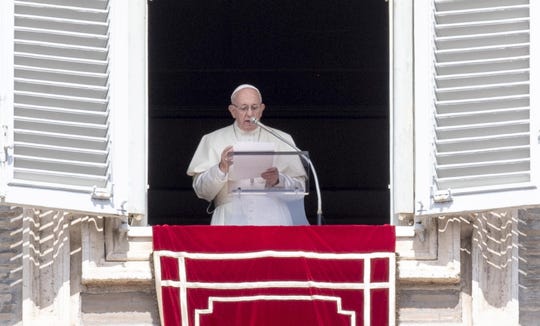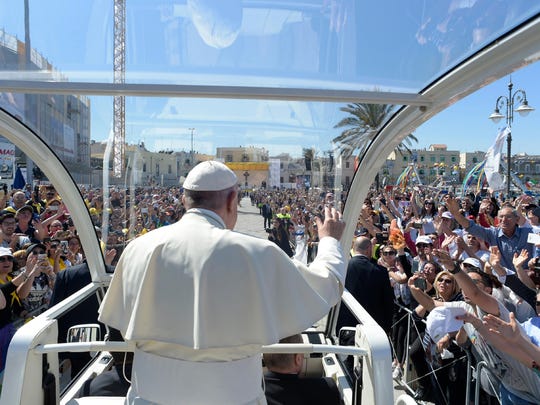My Response: Clerical Sex Abuse is the problem of the entire Church, not only Pope Francis. It is sad that Francis' critics are using the sex abuse scandal as their weapon of choice to undermine his papacy. There will be no winners in this struggle between conservatives and progressives. I pray for courage and wisdom and a new outpouring of the Spirit within all including Francis and his brother bishops. Bridget Mary Meehan ARCWP, https://arcwp,org
VATICAN CITY – The latest – and most serious – wave of pedophilia and cover-up allegations to hit the Vatican is shining a new light on the gap dividing the world’s 1.2 billion Catholics. And almost none of it is about the charges of widespread clerical abuse scandals.
Dozens of commentators and Vatican watchers have pointed to the wide gap between the views of conservative, traditional Catholics in the mold of Pope Benedict XVI and those of reform-minded Catholics like Pope Francis. Many media have referred to what is happening as a kind of “civil war.”
Though he is widely popular among non-Catholics, Francis has been a polarizing figure among the faithful since he was first elected five years ago.
The latest sex-abuse allegations, specifically those raised by Archbishop Carlo Maria Viganò, former nuncio to the United States, have only increased public pressure on Francis to resign in order to save the church.
BY FLORIDA POWER & LIGHT
Fan or Fiction?
See more →

Viganò named more than two dozen current and former Vatican and U.S. officials and accused them of knowing about and covering up for ex-Cardinal Theodore McCarrick, who is accused of sexually molesting and harassing minors as well as adults. He accused Francis of rehabilitating McCarrick from canonical sanctions imposed on him by Benedict in 2009 or 2010. The Vatican has known since at least 2000 that McCarrick slept with seminarians.
Adding to the crisis within the Vatican was a grand jury report in Pennsylvania that detailed the specter of more than 1,000 alleged underage victims of abuse by more than 300 priests over the span of seven decades.
On Thursday, Pope Francis accepted the resignation of a U.S. bishop and authorized an investigation into allegations he sexually harassed adults, adding awkward drama to an audience with U.S. church leaders over the abuse and cover-up scandal roiling the Catholic Church.
The resignation of West Virginia Bishop Michael Bransfield was announced just as the four-member U.S. delegation was sitting down with Francis in his private study in the Apostolic Palace.
Earlier this week, Francis summoned the presidents of Catholic bishops conferences worldwide to the Vatican in February to discuss protecting children and preventing sexual abuse by priests. The meeting, on Feb. 21-24, is believed to be the first of its kind and comes amid the growing criticism over the pope's handling of sex-abuse cases dating back decades.
But Robert Mickens, a veteran Vatican analyst who is now the editor of La Croix International, said the sex-abuse scandal masks a major rift in the church about its direction under the current pope.
More: Pope Francis orders probe of sex abuse charges against resigned West Virginia bishop
“The trouble calling what is happening with these scandals and the church a ‘civil war’ is that these two camps have existed since the start of Francis’ papacy, plus the fact that the situation has very little to do with the sex scandals,” he said.
Mickens maintained that strong critics are a small minority among Catholics, albeit a loud one adept at using social media.
Though the pope’s trip to Ireland Aug. 25-26 sparked protests there, Mickens’ views have mostly been reflected by other papal crowds – including those at the Vatican this month. Both events were full and all but free of placards criticizing Francis. While those on hand were outraged by the pedophilia scandals they were also mostly supportive of the Argentine pontiff.

Pope Francis leads his Angelus prayer from the window of his office overlooking Saint Peter's Square at the Vatican on Sunday, Sept. 2. (Photo: EPA-EFE)
“The church needs to clean up its act, but if a man like Pope Francis cannot do it, I don’t know who can,” said Vivian Hanson, 49, a paralegal visiting Italy from Jacksonville, Florida.
Sandro Manna, 34, a food distributor from Rome, agreed: Pope Francis “is obviously a very holy man, and we have to have faith he will take the right steps,” he said.
Kathy Olberding, 61, a nurse on vacation in Italy from Cincinnati, said she thought the Vatican had to know these problems would emerge.
“People are outraged at all these terrible stories of sex abuse,” she said. “I wish the stories weren’t true, but they are, and someone has to be held responsible. The pope is in charge, and so the question is whether he can fix it or whether it will have to be someone else.”
After the 2013 conclave that made Francis pope, he said his first words to the College of Cardinals that elected him were: “May God forgive you for what you have done.”
Many traditional Catholics may have wished the cardinals selected someone else even early on. In the weeks and months after his election, critics opined that Francis was not scholarly enough, too eager to reach out to non-Catholics, too willing to take on the status quo in the church, willing to embrace secular figures on issues like alleviating poverty and confronting climate change, and far too forgiving to groups including homosexuals, divorcees and women who have had abortions.

Pope Francis greets the crowd to celebrate a mass in Molfetta, southern Italy. (Photo: VATICAN VIA AFP/GETTY IMAGES)
Francis has not been shy about his frustrations. “Reforming Rome is like cleaning the Sphinx in Egypt with a toothbrush,” Francis joked to church leaders in the Vatican last December. The crowd on hand, which including many of Francis’ critics, elicited only a few mild chuckles.
“It seems strange to use the problem of clerical sex abuse to attack the pope,” Mickens said. “Abuse is a disease that cuts across the church. Many of the victims came from dioceses run by papal critics. But that isn’t the problem: They don’t like the pope because of his political views.”
Alberto Melloni, a history of Christianity professor from Italy’s University of Modena and Reggio Emilia, echoed those views.
“What we are seeing are not attacks against the pope,” Melloni said. “In reality they are attacks against the church, and they are aimed at dividing it.”
To some extent, the critics are succeeding.
Cardinal Raymond Burke, who was archbishop of St. Louis until his retirement in 2008, is one of Francis’ most vocal detractors. Burke is one of four authors of a June letter that was openly critical of Francis’ view that individual priests could decide on an ad hoc basis whether to allow divorced Catholics to receive communion. Burke has publicly praised U.S. President Donald Trump and has frequently conferred with former Trump strategist Steve Bannon on ways to oppose Francis. Now, a rising number of clergy are reportedly following Burke’s lead.
“Catholics are at a crossroads, as they have been many times before,” said Alistair Sear, a retired church historian living in London. “Sometimes the crossroads split the church. There have been times when two or even three different figures claimed to be the legitimate pope at the same time. But most of the time, one side makes a lot of noise for a while, and then it fades away.”
The Vatican has declined to comment on criticisms of the pope from church figures.

No comments:
Post a Comment
Note: Only a member of this blog may post a comment.